PUBLICATIONS
Illicit markets and targeted violence in Afghanistan
This paper looks at targeted assassinations through the lens of illicit market violence in Afghanistan. It explores its potential as a key proxy to project current and future trends of other illicit and criminal market development in the country. The paper suggests a framework for further research to examine the evolution of illicit markets in Afghanistan by using a methodologically sound proxy indicator of such violence.
Ana Paula Oliveira
May 2022
Illicit financing in Afghanistan: methods, mechanisms and threat-agnostic disruption opportunities
Illicit actors in Afghanistan, including drug traffickers, warlords, terrorist groups, and even former government officials, exploit the country to achieve their own political and economic objectives. This paper provides a historical and contemporary overview of illicit financing activities in Afghanistan. It uses a terrorist financing framework to explain the various mechanisms involved in how illicit actors raise, use, move, store, manage, and obscure their funds. Specific jurisdictions used for illicit finance and global financial vulnerabilities that illicit actors with a nexus to Afghanistan exploit in their financial activities are discussed, outlining the threat-agnostic capabilities that could tackle some of these illicit financial challenges.
Jessica Davis
May 2022
Human trafficking in the Afghan context: caught between a rock and a hard place?
Decades of wars and internal conflicts have driven generations and millions of Afghan families into impoverishment, illiteracy, unemployment, and displacement, rendering them unable to provide for their household members, particularly children. Political instability and conflicts have increased human suffering and vulnerabilities, eroded community resilience, stripped people of legitimate and viable economic options, opportunities, and livelihoods, as well as amplifying (in several cases also creating new forms of) human trafficking activities and practices. Drawing on existing academic and grey literatures, expert interviews and media reports, this paper first provides a brief overview of human trafficking situations, forms, their widespread reach and practices in the Afghan context before and after the Taliban’s takeover in August 2021. Second, it discusses the potential implications and impact of various actors’ policies, intentions and perspectives both on the humanitarian crises in Afghanistan, and on human trafficking in particular.
Thi Hoang
May 2022
Transnational governance networks against grand corruption: cross-border cooperation among law enforcement
Fighting grand corruption requires transnational cooperation among law enforcement agencies, to be able to ‘follow the money’ on its typically complex route around the globe. This paper sheds light on how a certain group of substate actors – law enforcement agencies – have formed a coalition of the willing to cooperate among themselves and support non-member agencies in sharing intelligence to fight grand corruption. It studies one particular innovation in this area, the International Anti-Corruption Coordination Centre (IACCC), a unit set up following the 2016 London Anti-Corruption Summit with core funding from the UK government.
Elizabeth Dávid-Barrett & Slobodan Tomić
May 2022
Drug trafficking, violence and corruption in Central Asia
This paper examines the links between illegal drug trafficking, violence, and corruption in Central Asia. The research demonstrates how drug trafficking is highly organised with major criminal and state actors participating in the illicit activity. Criminal violence is spread across the region, especially in urban areas, but the Central Asian states are capable of intercepting and preventing illicit activities. By analysing big data on violence, drug interdictions, and patterns of corruption in the region between 2015 and 2022, we explain the relationship between drug trafficking and key actors from the criminal underworld and state agencies in Central Asia.
Erica Marat & Gulzat Botoeva
May 2022
Evaluating Afghanistan’s past, present and future engagement with multilateral drug control
This paper charts the history of Afghanistan’s interaction with the international drug control system and the complex relationship between national–international policy formation. Drawing on primary documentation from US and British archives, as well as secondary literature and interviews, it tells the story of Afghanistan’s relationship with and impact on evolving global drug regulations from the birth of the League of Nations drug control system through the 1961 UN Single Convention on Narcotic Drugs and up to the present day. The research suggests the need for a more nuanced historical awareness of Afghanistan’s role within multilateral drug control as a way to understand its roles in the creation of the modern licit drug economy and its continued role in the modern illicit drug economy. Further, it demonstrates the need to engage broader society in discussions, to ensure more continuity is built into the system—as relationships built with the old regime in Afghanistan have collapsed.
John Collins & Ian Tennant
May 2022
Combating money laundering: does implementing the Financial Action Task Force recommendations bite?
The Financial Action Task Force (FATF) focuses on combatting money laundering. In February 2012, it codified its recommendations, ‘FATF Recommendations 2012’, consisting of a framework of measures and international standards to combat money laundering and terrorist financing. Once a country agrees to follow the recommendations, it has to produce its anti-money laundering (AML) framework that FATF can assess. In this paper, we attempt to answer a simple question: is this working? We look at a group of eight countries in Africa and the Middle East that in the 2012– 2020 period have voluntarily agreed to implement these recommendations and test whether suspected illicit financial flows (IFF), measured through the trade-gap methods, decline after the decision to implement FATF recommendations. Our results point to a reduction of the trade gap characterising tax avoidance through import under-invoicing and/or Trade Based Money Laundering (TBML) through export over-invoicing.
Sami Bensassi & Arisyi Fariza Raz
May 2022
Organised crime as irregular warfare: strategic lessons for assessment and response
This research uses decades of lessons and experience gained in irregular warfare (IW) – and in counterinsurgency in particular – to assist assessment and response to organised crime. Whereas recent experience with counterinsurgency in Iraq and Afghanistan presents mostly cautionary tales, tremendous insight can be gained from the scholarship and precedents that emanate from the broader field. Applying IW theory and experience to the problem of organised crime emphasises its indispensable context: how societies work, how governance and economic practice become corrupted, and how states can react, both to suppress the problem of crime but also to address its root causes. In this first phase of the research, lessons for strategy, policy and practice are identified, and plans for follow-on research where a framework for assessment and action previously elaborated for irregular challenges will be adapted for the specific problem of organised crime to assist in analysis and response.
David Ucko & Thomas Marks
May 2022
The illicit financialisation of Russian foreign policy: mapping the practices that facilitate Russia’s illicit financial flows
This paper categorises the practices used by Russian Kremlin-connected actors to advance Russian illicit financial flows (IFF) and depicts them, as well as their relationships to one another and to IFF in a novel framework. It argues that conclusively identifying and tracing IFF in authoritarian environments is very difficult due to the politicised nature of authoritarian legal systems and the inevitable data gaps. Our framework seeks to remedy these challenges by mapping malign practices, enacted by Russian actors in collaboration with elite overseas partners to create conditions friendly to Russian IFF, across three vectors: 1) political activities, 2) media activities and 3) political violence. We argue that the deployment of these practices is deeply connected to Russian foreign policy objectives, which are built in part on informal and patronal relationships with domestic elites. Thus, the principal actors in Russian foreign policymaking and -doing are not state institutions but elites, intermediaries, private companies, and organised crime groups.
Catherine Owen, Tena Prelec & Tom Mayne
May 2022
Can messaging help us to fight serious organised crime and corruption in Albania?
Strategies to counter serious organised crime (SOC) and corruption typically include an awareness-raising or messaging element. The hope is that this will engender both intolerance of corruption and SOC as well as public support for non-corrupt leaders and anti-SOC policies. A growing body of research, however, suggests that raising awareness of ‘social bads’ like organised crime and corruption may risk doing more harm than good. This research therefore aims to examine what effect a range of messaging strategies would have in Albania, a country that struggles with the malign effects of both corruption and SOC. It is therefore imperative to develop effective anti-SOC and anti-corruption strategies. The research tests the effect of different kinds of anti-SOC and anti-corruption messages in Albania, reporting on a nationally representative sample of 3,003 Albanian adults. The research finds similar negative impacts of messaging campaigns, considering whether the best way forward is to design new kinds of messages, or to move away from messaging campaigns in favour of deeper and more sustained forms of engagement. In either case, the path ahead should involve rigorous testing in order to avoid unintended consequences and ensure that investments are well spent.
Nic Cheeseman & Caryn Peiffer
May 2022
Targeted sanctions and organised crime: impact and lessons for future use
This research reviews existing evidence on the use and impact of targeted sanctions to disrupt organised criminal activity. It focuses on two case studies, Colombia and Libya, in differing regions of the world and with different exposure to organised crime-focused sanctions. The research analyses organised crime-related sanctions data, examines the current state of knowledge relating to the implementation and impact of these sanctions, and draws on the two case studies to identify a number of factors that influence the effectiveness of organised crime-focused sanctions. While the research focuses on other jurisdictions with track records of using sanctions to disrupt organised crime, implications for the UK are also explored, with a view to informing UK policy thinking on the potential establishment of an organised crime-focused sanctions regime.
Cathy Heinlein, Sasha Erskine, Elijah Glantz & Tom Keatinge
May 2022












